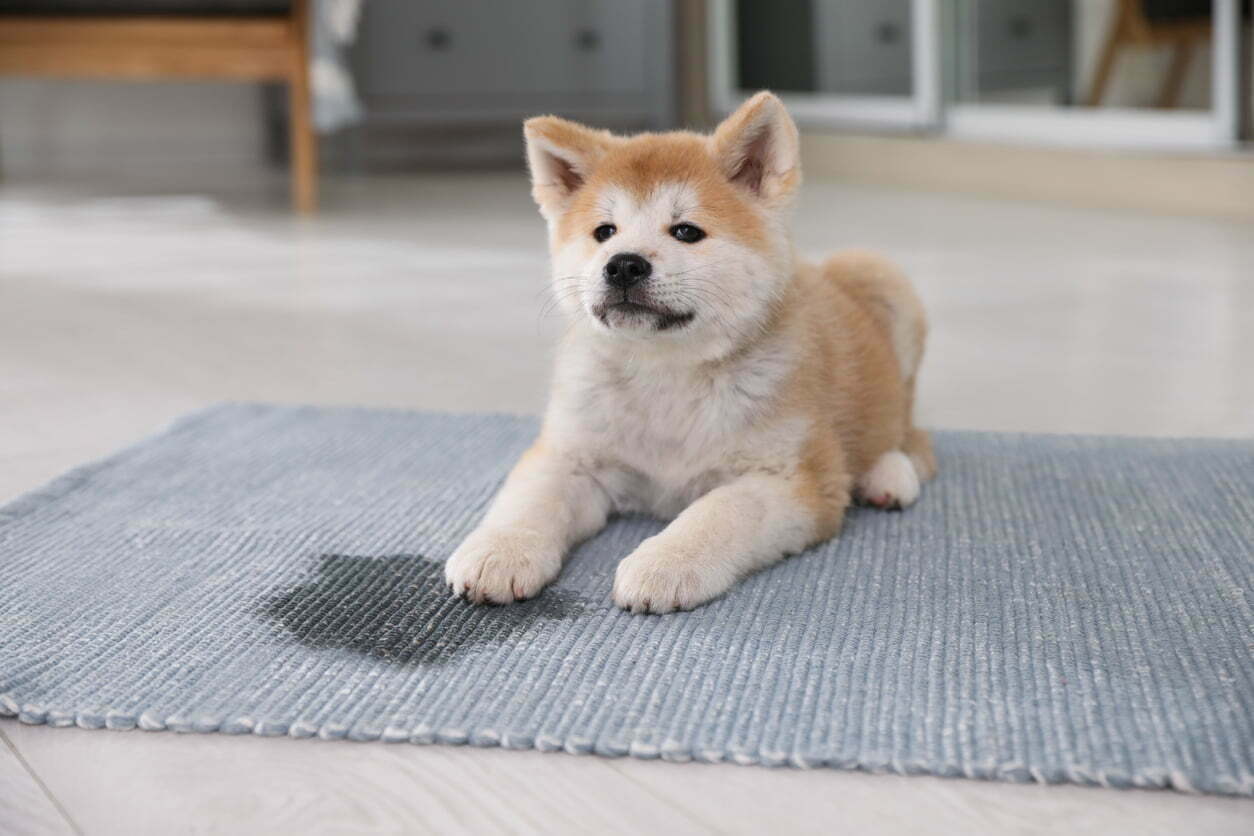
Elderly dogs and young puppies alike have the occasional accident where you least want it to happen – inside.
Even adult dogs can sometimes have a slip-up that results in a yellow stain on your carpet.
Cleaning up dog urine isn’t a pleasant way to spend your day. Dog pee is smelly, and messy, and it’s time-consuming to get rid of stains.
Key Takeaways
- Dog urine contains ammonia, which can irritate the sinuses, lungs, and eyes, particularly affecting young children, the elderly, and those with respiratory conditions.
- Exposure to dog urine can also lead to infections like salmonella and leptospirosis, which are harmful to both humans and pets.
- Regular vaccinations and anti-parasite treatments for dogs can reduce the risks of transmitting diseases through urine.
- Thoroughly cleaning areas affected by dog urine, using disinfectants and appropriate safety measures, is crucial to prevent health hazards.
- Taking preventive actions, such as not allowing dogs to drink from stagnant water sources and avoiding contact with wild animals, can further protect against infections.
Is it actually harmful to humans?
Of course, getting it on your skin is not ideal. But are there negative health effects of breathing in dog urine?
See also:
- Crystals in Dog Urine: A Sign of Trouble?
- Urinary Care Dog Food: Top 5 Diet Options for Optimal Urinary Health
- Urine Scald in Dogs: 5 Best Treatments
- Mucus in Dog Urine: 5 Key Causes and How to Help You Dog Now
- How Long Can a Dog Go without Peeing: 7 Healthy Answers
It can depend on a few things, like if your dog is up to date on their vaccines and takes regular anti-parasite medications.
It could be you personally:
Some people are also more susceptible to the potentially harmful effects of exposure to dog urine.
Wait!
Don’t banish your dog outside just yet—there are plenty of easy steps you can take to avoid the ill effects of cleaning up an accident.
What Can You Catch From Dog Urine?
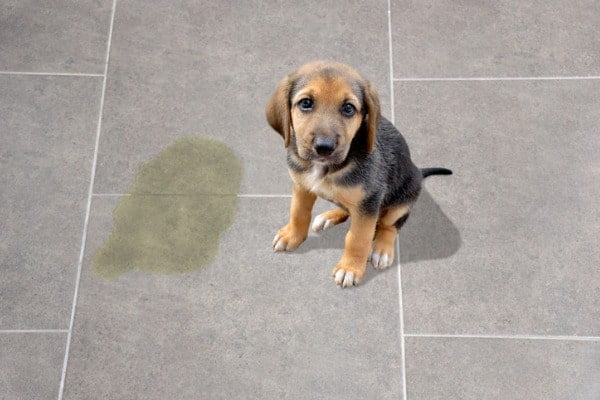
Pet parents should be aware of some health hazards of dog urine and feces, especially before they try to clean up.
Ammonia
Dog and cat urine contain levels of ammonia that can irritate the sinuses, lungs, and eyes.
Who is vulnerable?
Healthy adults can usually power through the smell long enough to wipe up a puddle.
However, young children, the elderly, and anyone suffering from things like COPD and asthma should avoid breathing in dog urine fumes.
A condition like asthma or other respiratory issues could be triggered by exposure to ammonia.
Salmonella
This is a bacteria found naturally in some reptiles.
Dogs and cats can catch salmonella – it’s not just people who can be struck with a bout of food poisoning.
Be aware:
If your dog or cat has a salmonella infection, coming into contact with their waste could pass the bacteria onto you as well.
Leptospirosis
Your vet will offer to vaccinate your dog against this disease, and it would be wise to accept.
Dogs can contract it if they drink water infected with the leptospira bacterium.
It can also be transmitted through the urine of wild animals found in rural or even urban areas, like raccoons.
If your dog is infected with leptospira, or “lepto,” for short, you should handle them with caution until they have received treatment.
Any contact with their urine puts you at risk of catching this illness.
Remember – It’s a Biohazard
There are other things in pet urine that can make you ill, but these three issues are the ones to look out for.
As a good rule, take safety measures when cleaning up a puddle or an accident.
For example, if your dog peed on your bed, it really is important to wash your linens in hot water on the longer cycle.
The Nasty Business of Carpet Accidents
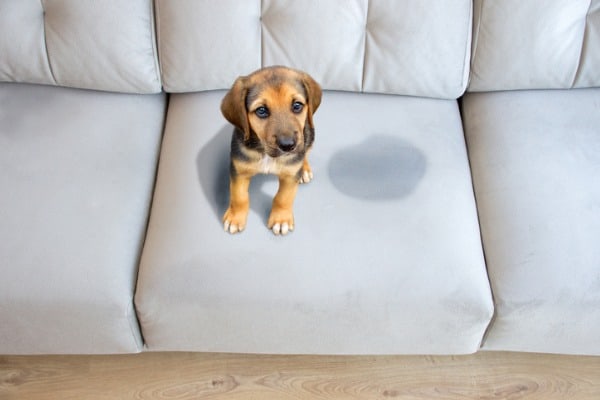
These are possibly the most frustrating kinds of potty mishaps to clean up.
Dog urine on the carpet is hard to soak up and leaves lingering smells and spots.
The same goes if they defecate on the floor.
Pet stains can seriously damage carpets, subfloors, and household furnishings, such as wood furniture and couches.
Now, back to that ammonia issue.
When a dog or cat pees on the carpet, it can be very difficult to get every ounce of urine out of the carpet.
This can become a problem if your dog has soiled multiple areas.
Or, perhaps the previous owners of your home left some unwanted gifts behind.
It’s important to understand that urine left on the carpet can evaporate and release an irritating amount of urine into the air.
There’s more:
Urine can also be a breeding ground for bacteria and molds, raising a whole new set of issues.
Old stains that weren’t cleaned properly can irritate the airways of the healthiest of people.
Young babies exposed to ammonia or microorganisms can develop serious health issues.
Don’t forget your pets:
They can also be affected by the fumes and byproducts of old stains.
Just because they might’ve leaked some urine when lying in their bed or sometimes smell like urine, it’s definitely not healthy for them.
Some carpets are beyond help, and it’s better to replace them than fight a losing battle of removing set-in stains.
Putting off doing so could put your subfloor at risk as well, which is an even more expensive fix if mold or moisture has been allowed to take root.
Learn how to remove pet urine from subfloors.
Even hard surfaces aren’t necessarily safe from stains.
Concrete flooring in garages and flooring like hardwood is porous enough that they can soak up some urine.
Getting the stains and smells out of these types of flooring is a lot more challenging.
It might require a power washer or professional cleaning to rid your domicile of urine fumes.
Cleaning Safely and Effectively
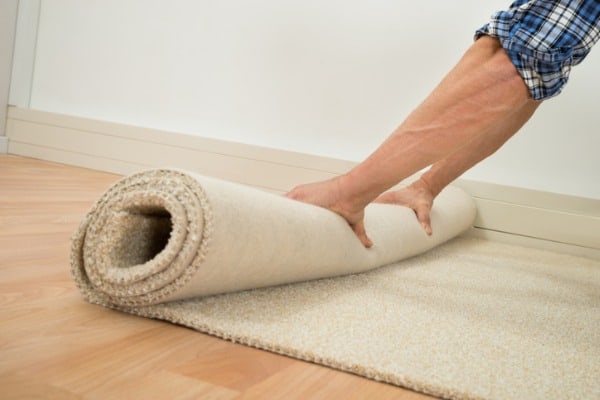
If your house has been the victim of one too many pet accidents, then replacing the floors is something you should seriously consider.
Otherwise, you might start feeling like you have allergies all year round.
Don’t expect grandma and grandpa to visit – or anyone with a weakened immune system, for that matter.
Don’t be hasty:
We know accidents happen, but the odd one here or there is rarely caused to rip up your carpets.
There are many things you can do to negate the risk of cleaning up dog urine and avoid the smell from permeating your home.
An Ounce of Prevention Is Worth a Pound of Cure
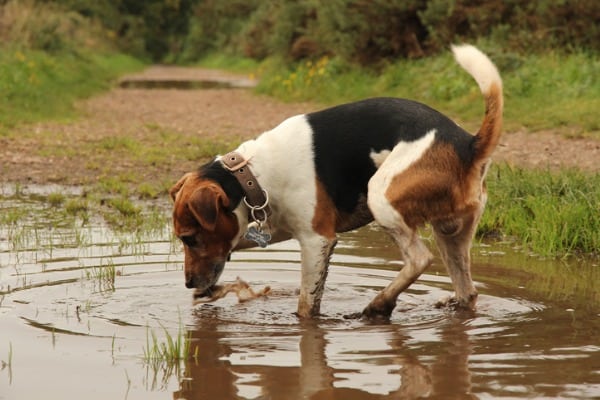
Lepto and salmonella are two harmful bacteria that can be transmitted to you via dog waste.
The lepto vaccine isn’t 100% effective in preventing your dog from getting it, but it greatly lowers the risk.
What else can you do?
Don’t allow your dog to drink from water sources like puddles, streams, or lakes.
If you have wild animals anywhere nearby, they can also be carriers of the bacteria.
Of course, forbidding your pets from having contact with any wild animal is ideal.
If you have opossums, raccoons, or small rodents hanging around, keep your pets from getting up close and personal with them.
Sometimes, these animals nest or otherwise take up residence in our very backyards.
It’s not their fault – no one gave them the memo that they’re not on the lease.
However, animal control can provide renters and homeowners alike with live traps so that such animals can be safely trapped and relocated to a better habitat.
The thing about lepto is that you could catch it directly from a wild animal too.
For example, if they urinate on grass, leaves, or your garden, you might inadvertently touch it and become ill.
What about salmonella?
There’s no vaccine for this one, but there are precautions you can take to keep your pet safe.
People sometimes make an honest mistake in thinking dogs can safely consume raw meat.
While their digestive systems are better equipped to digest it, they are still at risk for the same foodborne illnesses that we can contract.
So, if you share meat with your dog here and there, do everyone a favor and make sure it’s cooked.
Packaging from meat should be disposed of properly – dogs can sniff them out, and the next thing you know, they’re garbage picking.
Don’t let your dog consume anything they find outside, and keep them away from dumpsters.
Dogs can be treated for salmonella, but avoiding it in the first place is ideal.
See also:
- How to get Dog Urine out of Clothes in 3 Easy Steps
- Dog Won’t Pee Outside: 9 Ways to Help and Understand Why
- Dog Drinking Own Urine: 5 Causes and How to Stop It
- Foamy Dog Urine: Solving the Bubbly Pee Problem
What if your dog did catch one of these bacteria?
You should be cautious about touching them until they’ve been given a clean bill of health from the vet.
We’re not saying don’t pet them for two weeks – we know that would be impossible.
Wash your hands after you touch them.
Sorry – but you should probably make them sleep on the floor instead of your bed until they’re all better.
It’s a good idea to keep them on surfaces that are easily cleaned, like tile or laminate.
If they’re carrying this disease and pee on the carpet, cleaning just got a lot more complicated.
What if they have an accident inside?
Sterile gloves are the best way to avoid contact with contaminated urine.
Use floor cleaner with a disinfectant and clean with disposable paper towels.
As always, clean your hands thoroughly with antibacterial soap afterward.
As for ammonia?
There are a few things you can do to protect your respiratory system while cleaning up dog or cat urine.
Air out the room if at all possible – open windows and doors to allow fresh air to circulate.
Face masks designed to filter out harmful smells like ammonia can be purchased online or in home improvement stores.
You might even have some on hand from the last time you painted the walls.
What’s more:
There is a wide variety of carpet sprays and cleaners designed to get as much urine out of the carpet as possible. See our list of best dog urine cleaners for full details.
You can also use DIY cleaners as preliminary steps to cleaning before using an effective natural cleaner (see the link just above).
You’ll want to use either in conjunction with a highly absorbent cloth that can soak up the liquid.
Even if your dog isn’t ill with anything, gloves are still a good idea when cleaning up a mess.
Dog Urine – A Health Hazard?
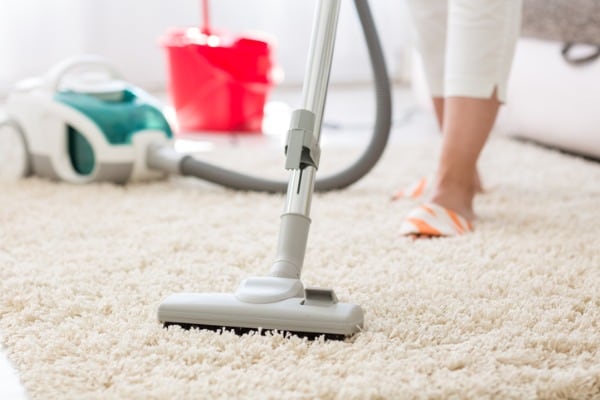
Cleaning up the waste of any species has a certain “ick” factor involved.
Dogs share our homes and lives, and as a result, we have to clean up their messes from time to time.
Should you panic about an accident? Probably not.
If your dog was more dehydrated, the darker the urine, and the more potent the stain.
Being aware of the potential health hazards of dog urine and feces is smart, but you don’t have to sell the house after one accident.
Remember:
Stay on top of the common illnesses that can be transmitted from dogs to humans through waste.
It’s a lot easier than dealing with it after it becomes a problem.
If bacterial infections aren’t a problem, then the smell and ammonia is the main thing to worry about. And even that has plenty of solutions.
If you’re already a pet parent, odds are you have plenty of carpet cleaner and old towels on hand.
Frequently Asked Questions
Is dog urine harmful to humans?
Dog urine can contain ammonia and bacteria that can irritate the sinuses, lungs, and eyes and cause respiratory issues. It’s not recommended to come into contact with dog urine, especially for young children, the elderly, and those with respiratory issues like COPD and asthma.
What are the health hazards of dog urine?
Dog urine can contain ammonia, salmonella bacteria, and leptospirosis. Contact with dog urine can cause respiratory issues, food poisoning, and transmission of the disease.
Can dog urine cause health problems for pets?
Yes, old dog urine stains can release fumes and byproducts that can irritate the airways of pets and humans. The fumes and bacteria from old stains can also cause health problems for pets.
How to clean dog urine from carpets?
Cleaning up dog urine from carpets can be challenging and time-consuming. It’s important to clean the urine thoroughly to avoid releasing fumes and bacteria into the air and to prevent a breeding ground for bacteria and mold. If the carpet is beyond cleaning, it’s better to replace it.
